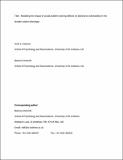Files in this item
Modeling the impact of social problem-solving deficits on depressive vulnerability in the broader autism phenotype
Item metadata
| dc.contributor.author | Jackson, Scott Luther James | |
| dc.contributor.author | Dritschel, Barbara | |
| dc.date.accessioned | 2017-05-09T23:33:06Z | |
| dc.date.available | 2017-05-09T23:33:06Z | |
| dc.date.issued | 2016-01 | |
| dc.identifier.citation | Jackson , S L J & Dritschel , B 2016 , ' Modeling the impact of social problem-solving deficits on depressive vulnerability in the broader autism phenotype ' , Research in Autism Spectrum Disorders , vol. 21 , pp. 128-138 . https://doi.org/10.1016/j.rasd.2015.10.002 | en |
| dc.identifier.issn | 1750-9467 | |
| dc.identifier.other | PURE: 225769750 | |
| dc.identifier.other | PURE UUID: b9d7d1f2-1499-4b39-ae2e-90016a000daf | |
| dc.identifier.other | Scopus: 84946761488 | |
| dc.identifier.other | WOS: 000366774100012 | |
| dc.identifier.other | ORCID: /0000-0002-0909-6323/work/64698253 | |
| dc.identifier.uri | https://hdl.handle.net/10023/10734 | |
| dc.description.abstract | The social communication and interaction deficits associated with the autism phenotype can have serious emotional consequences for individuals on the autism spectrum. This can be particularly true during young-adulthood, a period of increased social demands and expectations. The current study investigated the specific role of social problem-solving deficits as a mediator in the relationship between autism phenotype severity and depressive symptomology in young-adults. A sample of 230 university students (48% male) ranging in age from 18-30 (M=21.30, SD=2.48) were assessed on autism phenotype expression (Autism-Spectrum Quotient), social problem-solving ability (Social Problem-Solving Inventory, Revised) and depressive symptomology (Beck’s Depression Inventory). Results indicated that deficient social problem-solving skills account for a significant portion of the depressive symptomology associated with increased autism phenotype expression. Path model analysis output suggested that increased expression of the social components of the autism phenotype are associated with both ineffective social problem-solving styles and attitudes, while increased detail orientation discourages the use of an impulsive problem-solving style. The findings of this investigation provide preliminary evidence suggesting that programs designed to improve social problem-solving skills could be beneficial in the reduction of depressive vulnerability for young-adults on the autism spectrum. | |
| dc.language.iso | eng | |
| dc.relation.ispartof | Research in Autism Spectrum Disorders | en |
| dc.rights | Copyright © 2015 Elsevier Ltd. All rights reserved. This work is made available online in accordance with the publisher’s policies. This is the author created, accepted version manuscript following peer review and may differ slightly from the final published version. The final published version of this work is available at https://dx.doi.org/10.1016/j.rasd.2015.10.002 | en |
| dc.subject | Autism-Spectrum Quotient (AQ) | en |
| dc.subject | Autism phenotype expression | en |
| dc.subject | Social problem solving | en |
| dc.subject | Depression | en |
| dc.subject | University students | en |
| dc.subject | Path model analysis | en |
| dc.subject | BF Psychology | en |
| dc.subject | NDAS | en |
| dc.subject.lcc | BF | en |
| dc.title | Modeling the impact of social problem-solving deficits on depressive vulnerability in the broader autism phenotype | en |
| dc.type | Journal article | en |
| dc.description.version | Postprint | en |
| dc.contributor.institution | University of St Andrews. School of Psychology and Neuroscience | en |
| dc.contributor.institution | University of St Andrews. Institute of Behavioural and Neural Sciences | en |
| dc.identifier.doi | https://doi.org/10.1016/j.rasd.2015.10.002 | |
| dc.description.status | Peer reviewed | en |
| dc.date.embargoedUntil | 2017-05-09 |
This item appears in the following Collection(s)
Items in the St Andrews Research Repository are protected by copyright, with all rights reserved, unless otherwise indicated.

